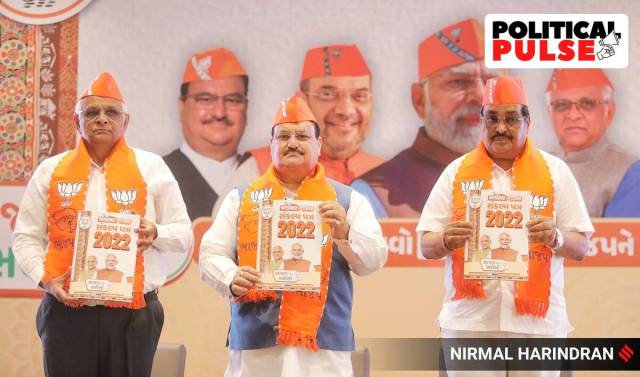Deradicalisation cells’ promise of BJP: In the works since 2020
Recommendations were first made by PM, Amit Shah at a meeting of top cops in 2015; inspiration is Telangana Police
 Radicalisation had featured in the agenda of the annual DGP conference held in the Great Rann of Kutch in 2015 as well, presided over by the PM.
Radicalisation had featured in the agenda of the annual DGP conference held in the Great Rann of Kutch in 2015 as well, presided over by the PM. The de-radicalisation cell that the BJP has promised in its manifesto for the Gujarat elections has been a plan in process, following recommendations from Prime Minister Narendra Modi and Union Home Minister Amit Shah at the annual conference of DGPs and IGPs in 2020.
Following the recommendations, a task force including a faculty head of the Gandhinagar-based Rashtriya Raksha University (RRU) and police officials of the state Anti-Terrorism Squad, Crime Branch and Ahmedabad Central Jail was set up. But the project could not take off because of “lack of funds”, said an official.
A top government official told The Indian Express that the project was inspired by an experiment by the Telangana Police, mainly to check “lone wolf incidents”.
In a recent interview to PTI, Shah said radicalisation should be checked in the entire country and that such cells should be considered by other states as well.
The source said that as per the plan, youth considered potential targets of radical groups would be identified and persuaded so as not to be swayed into terror acts. “The bigger security threats to the state are the lone wolves who are hard to detect,” the official said.
It was a year ago, in October 2021, that a task force was set up under the aegis of the Additional Director General of Police, Prisons and Correctional Administration, K L N Rao, comprising Himanshu Shukla, then DIG, ATS; Joint commissioner of Police, Crime Branch, Premvir Singh; Superintendent, Ahmedabad Central Jail, Rohan Anand; and Director, School of Criminology and Behavioural Science at RRU, S L Vaya, for the purposes of drawing up a deradicalisation programme.
It was to come up with a “pilot project to prevent criminalisation and radicalisation of inmates in prisons”, sources said.
Vaya told The Indian Express, “RRU sent a proposal to set up a Forensic and Mental Health Cell inside the Ahmedabad Central Jail after which the government sanctioned Rs 16 lakh, and the task force was formed. But the funds were not enough.”
RRU Vice-Chancellor Dr Bimal Patel said: “This can be achieved only with the collaboration of government agencies, institutions and those who need assistance, as it is a social problem and tools would have to be designed to address it. It is a problem of the world, and not just of India.”
A senior police officer cited an instance of “deradicalisation” by the Telangana Police in 2015, when three youths who had left their homes in Hyderabad to head to Srinagar and had been brought back, were put through counselling sessions rather than facing punishment. According to an Indian Express report of 2016, the three told police during counselling that they planned to go to “Afghanistan, Iraq, Syria and Palestine through Kashmir… to join the Islamic State”.
Of the three, one tried going back and was reported by his parents to authorities. He was put through several successive counselling sessions.
Radicalisation had featured in the agenda of the annual DGP conference held in the Great Rann of Kutch in 2015 as well, presided over by the PM. The then Telangana DGP Anurag Sharma had given a presentation in the context of the threats from the Islamic State, at the meeting.
An Indian Express report from the time quoted Sharma as telling the conference that the socio-economic exclusion of Muslims and random arrest of youths from the community in the aftermath of a terror attack were leading to radicalisation among the minorities.
In the interview to PTI, Shah said: “Radicalisation has nothing to do with any sect, but we all know which forces are promoting radicalisation. And the entire world is concerned about it.”
While he mentioned the BJP manifesto for the Gujarat polls in this context, it does not have any details about these “anti-radicalisation” cells to be set up. Party leaders too admitted to be in the dark on the nitty-gritties of the plan.
At an election rally in Sanand too, Shah talked about such cells, saying: “Redressing an incident after it has happened is one thing, but not allowing it to happen again is another. If radicalization is tackled pro-actively, then riots and terrorism will automatically be controlled.”































